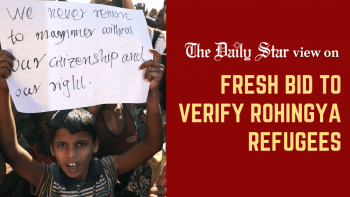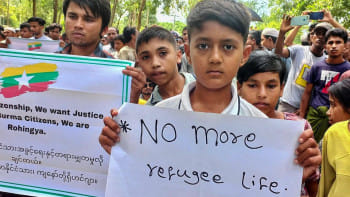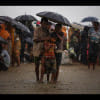Myanmar’s hybrid democracy is no democracy at all

The recent announcement on dissolving Aung San Suu Kyi's National League for Democracy (NLD) party does not come as a surprise, for the last course of its unravelling had been set in motion earlier in the year. The Political Party Registration Law – announced on January 26, 2023 – repealing a 2010 legislation, set multiple requirements and clauses that would make fresh registration for political parties almost impossible.
The new law disqualifies any individual with previous conviction from joining a political party. This by default disqualifies multiple members of the NLD senior leadership, including Suu Kyi herself and former president Win Myint, from playing a role in any capacity in the bigger political sphere of Myanmar. And for obvious reasons, NLD refused to register as per the new law, or even participate in an election under the military junta.
There are many other ludicrous logistical challenges in the new law that makes registration sustenance difficult for the majority of parties. For instance, under the new law, any national political party has to fund USD 47,000 to qualify for reregistration. In Kyat – Myanmar currency – it comes to 100 million, which for any small to medium scale political party is a huge sum. Also, any political party or group planning to nominate an electoral candidate must have at least 100,000 members within three months of reregistering – a whopping rise from 1,000 members required under the previous law.
The international community is rightfully saying that the junta is using legal instruments to gain legitimacy in the political landscape through a staged, superficial election "process". But in the context of Myanmar's bloody and volatile political history with the military resorting to brutality and massacre to gain power on multiple occasions, this move should perhaps be seen as a fresh attempt by the junta to try and put on a civilised face.
Interestingly, the root of the recent headlong fall of Myanmar's democracy lies in the very reforms that the previous junta had initiated to try to transition to a hybrid power-sharing model of democracy. Unfortunately, military-drafted constitution that was passed through a 2008 referendum had been curated in such a way that only safeguarded the interests of the military. Article 17.b, for instance, enabled the military to hold the reins of three key ministries – Ministry of Defense, Ministry of Border Affairs, Ministry of Home Affairs – literally making any future democratic government the Tatmadaw's hostage. Then Article 14 ensured that the Tatmadaw had 25 percent of the parliamentary seats in all parliaments, reserved for their appointees. Moreover, the Tatmadaw kept the power to veto over any constitutional change.
With the junta in power and engaged in frequent violent conflicts with armed resistance groups, the fear of further Rohingya exodus or internal tension spilling into the region, remain major headaches for the neighbours, especially India and Bangladesh.
While the NLD and some other parties had initially rejected the constitution and refrained from taking part in the 2010 general elections, they did participate in the 2012 bi-elections and later the NLD won the 2015 general elections by a landslide. But even after winning with such overwhelming support, Suu Kyi, during her fragile tenure, did not – and perhaps could not – do anything to change the power dynamics with the Tatmadaw.
What is even more unfortunate is that in trying to play along with the Tatmadaw, Suu Kyi failed to demonstrate even the basic moral compass, and her moral superiority as a democratically elected national leader was fully compromised when she provided tacit support to the Tatmadaw during their bloody genocide of the helpless Rohingya in 2017. Her silence on this burning issue exposed the moral corruption of the hybrid model democracy in the country. Suu Kyi's complicity or failure only emboldened the military junta, to the point where they felt that they no longer even needed the guise of democracy to rule.
But why point the finger at Suu Kyi alone for the aggrandisement of the military? This has been in the making for over decades. The lack of synergy between the people of Myanmar has also been a key enabler of rising military power. While it is understandable that it is not possible for people from various ethnic backgrounds to fully coalesce into one single ethno-cultural identity, but acceptance of diversity, peaceful co-existence and shared national identity should have been common meeting points for all. But in Myanmar, the scenario has been different for a long time. Multiple civil wars since independence in 1948 have further deepened Myanmar's ethnic and religious fault lines, and enabled the military to unify against the divided civilians.
Also, the Buddhist-nationalist majority unfortunately took part in and provided moral support to the junta's suppression of the ethnic minorities. Case in point: the anti-Muslim hate speech of the Buddhist nationalists in the lead up to and during the 2017 attacks on the Rohingya only fuelled anti-Rohingya, anti-Muslim sentiments among the people and generated support for the junta's actions.
The recent political developments in Myanmar carry significance for regional stability. With the junta in power and engaged in frequent violent conflicts with armed resistance groups, the fear of further Rohingya exodus or internal tension spilling into the region, remain major headaches for the neighbours, especially India and Bangladesh. The recent escalation of tension along the Bangladesh-Myanmar border with shells falling inside Bangladesh territory has already added to the strained relationship between the two neighbours.
This has also put into question the issue of Rohingya repatriation. While the region should keep a close eye on the political developments in Myanmar, Bangladesh and the international community should weigh all aspects before repatriating the refugees and in dealing with Myanmar.
Tasneem Tayeb is a columnist for The Daily Star. Her Twitter handle is @tasneem_tayeb

 For all latest news, follow The Daily Star's Google News channel.
For all latest news, follow The Daily Star's Google News channel. 








Comments